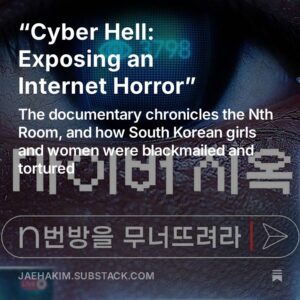“The Trunk” (트렁크)

Adding a twist to the contract marriage trope, “The Trunk” tackles the plot device from a film noir perspective.
Journalist, Author & Syndicated Columnist

Adding a twist to the contract marriage trope, “The Trunk” tackles the plot device from a film noir perspective.

“Officer Black Belt” is an action-packed thriller starring Kim Woo-bin. Is it predictable? Yes? But is it a fun watch? Absolutely!

The Nth Room targeted Korean women in a lower socio-economic class who needed money. They also set their marks on underage girls, who were too young to handle what they had been tricked into. These crimes are continuing, but now with with teenage boys at the helm.

“At eight years of age, it was an easy transition [to the U.S.],” said “Squid Game: The Challenge” winner Mai Whelan. “The hardest was learning English, because there are so many tenses. In Vietnamese, we have general, formal and no tenses.”

By Jae-Ha Kim Substack February 15, 2024 ☆☆☆☆ Lee Tang (played by Choi Woo-shik) Jang Nan-gam (played by Son Suk-ku) ↑Note: Korean names denote the surname followed by the given name. In Korean, the literal meaning […]

The gore in this K-drama is intense and unrelenting — so much so that it ironically begins to lose impact. But amidst all the violence are well-developed stories of families, love and patriotism — and that’s what prevents this series from being just another horror show.

There is a recurring dream sequence in “Doona!” A young woman is submerged in water. From below, she can see the glitz and glamour of her life as a top star. But when our protagonist startles herself awake, we see her living a mundane life, waking up sweaty in a small apartment and taking long drags of cigarettes in the courtyard. This is how we meet Lee Doo-na, a famous K-pop idol who is hiding away in a shared house for college students.

A remake of the Taiwanese series “Someday or One Day,” the Korean version of this time-travel drama isn’t always easy to follow. But if you suspend your belief in reality and just go with the flow, you will find yourself immersed in a compelling plot that centers on love, while it also navigates story arcs about guilt, gaslighting and a, erm, serial killer.

On the surface, it appears that “Mask Girl” is about beauty standards and how our looks are a catalyst for who we will become. But by the end of the series, viewers will have been taken on a wild ride where subterfuge and revenge are the norm, rather than the exception, and everyone’s moral compass has been broken.

What both seasons of “D.P.” does so well is tell the important and uncomfortable stories that no one wants to believe are true. When soldiers are regularly humiliated, degraded and tortured, what right does anyone have to tell the victims that they must return to their abusers?

“Celebrity” tackles the ‘dark side’ of social media. When haters are anonymous, they’re emboldened to be cruel.

“Bloodhounds” offers sweet bromance. But this K-drama also has a brutal take on morality.

“Black Knight” takes place 40 years after a comet crashed into Earth, nearly destroying the entire population. The Korean series is clearly a parable for what could happen to our world if we don’t take better care of the most vulnerable among us.

A fast-moving action film, “Yaksha: Ruthless Operations” is a spy thriller full of special ops, backstabbing and political intrigue. Last year, I stopped watching about 20 minutes into the movie, because it didn’t hold my interest. But when I went back to it this year, I found it to be thoroughly entertaining. Is this a prestige film? Absolutely not. But it was a fun ride with a (straight-laced) fish-out-of-water concept.

“XO, Kitty” tackles adoption, diaspora and maintaining Korean ties. But is it any good? Not really.

A psychological thriller that sounded much better than it actually is, “Somebody” revolves a serial killer (Kim Young-kwang) who uses a dating app to find his victims — and the app developer (Kang Hae-lim) who identifies with him, even after finding out his true identity.

One of the best K-dramas of the year, “Queenmaker” is the latest female-centric series led by women in their 40s (and older) that in nail-bitingly good. A political thriller with twists and turns, two foes unite to take down a corrupt chaebol family that will stop at nothing to protect their financial and familial interests.

“Physical: 100” is riding high on the assumption that this athletic reality series is the real-life version of “Squid Game.” But as everyone knows by now, reality is a concept used to sell unscripted shows that are at least partially scripted to tell a certain story. Is this series fun to watch? At times. Is it novel? Not really. Anyone who remembers “American Gladiators” will recognize the cheese factor that drives these programs.

답답해. That’s the first feeling that comes to mind when I think of the K-drama “The Interest of Love.” The entire series is about a group of broken people who can’t articulate how they feel and are in a constant state of unhappiness because of this.

“The Glory” had so much promise — a strong leading lady (Song Hye-kyo), a skilled screenwriter (Kim Eun-sook), the backing of Netflix’s money, and the promise of a scintillating revenge thriller. And yet at the end of the eight-episode first season — stop doing this, Netflix! — I found myself underwhelmed.